Key takeaways:
- Plagiarism includes not just copying text but also improper paraphrasing and using others’ ideas without credit, highlighting the need for academic integrity.
- Maintaining a detailed reference log and utilizing plagiarism detection tools helps prevent unintentional plagiarism and reinforces the importance of originality.
- Open communication with mentors and peers fosters a supportive environment for discussing citation practices and enhances understanding of academic integrity.
- Engaging deeply with sources and reflecting on one’s own contributions promotes authenticity and clarity in scholarly writing.
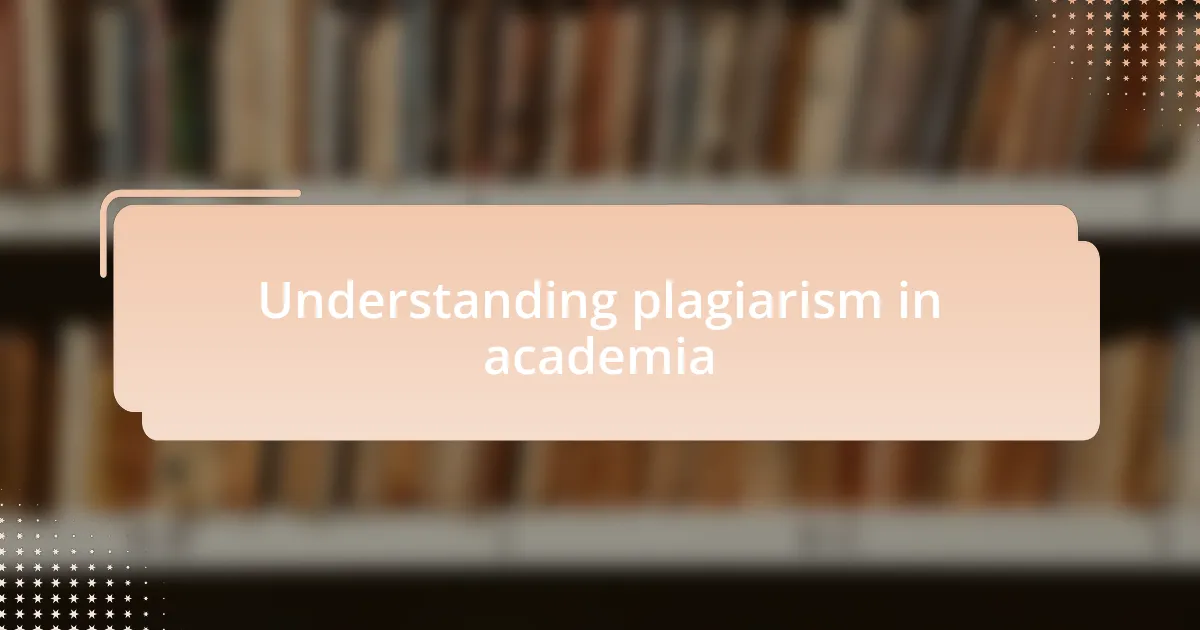
Understanding plagiarism in academia
Plagiarism is often misunderstood. Some may think it’s just about copying text verbatim, but it encompasses a wider range of issues, including paraphrasing without proper attribution and even using someone else’s ideas without giving credit. I remember grappling with these nuances during my own research; it made me realize how easy it is to unintentionally blur the lines. Have you ever found yourself unsure about what constitutes plagiarism? It’s a common concern that can spiral into significant academic repercussions.
What struck me most was the emotional weight of discovering that I might inadvertently claim someone else’s hard work as my own. I think it’s crucial to acknowledge that plagiarism can stem from pressure—whether from tight deadlines or the anxiety of meeting publication standards. When I faced this, I had to remind myself that integrity should always come first, even if it meant taking extra time to ensure my work was original and properly sourced.
Moreover, understanding the implications of plagiarism can be critical to our growth as scholars. It’s not just about avoiding sanctions; it’s about fostering a culture of respect for knowledge. I often ponder: how can we contribute authentically to our field if we don’t safeguard the ideas that inspire us? Each piece of work builds on the last, and by crediting our predecessors, we honor the collaborative spirit of academia.
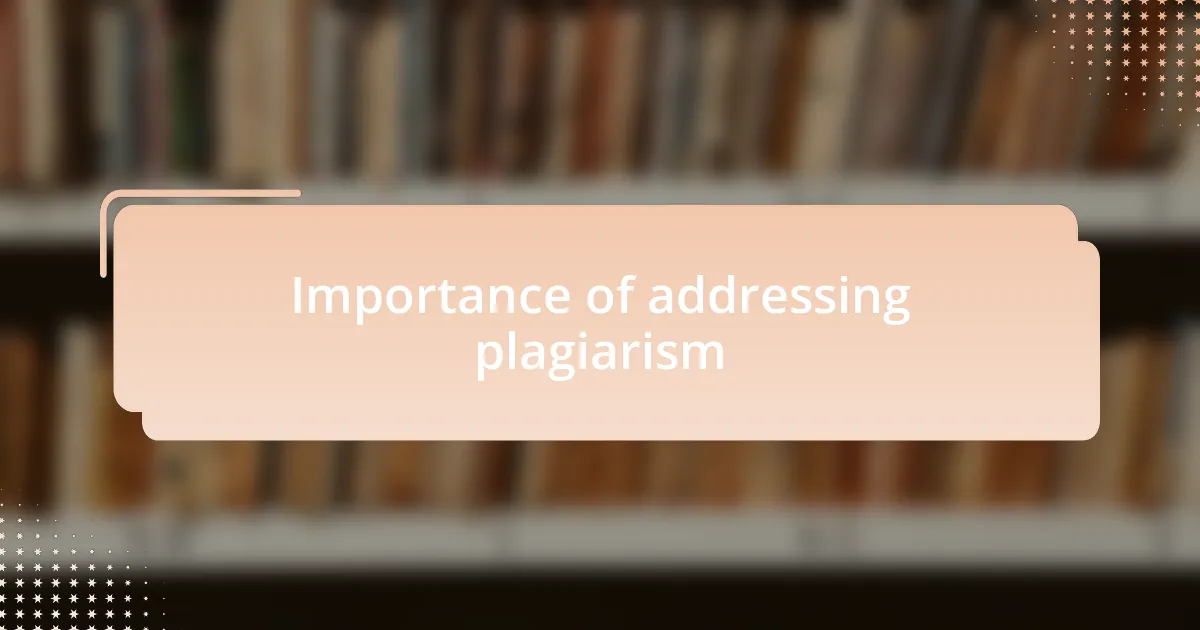
Importance of addressing plagiarism
Addressing plagiarism is essential not just for maintaining academic integrity, but also for preserving our credibility as researchers. When I was refining my dissertation, I often wondered: what legacy do I want to leave in this field? Ensuring that all my sources were properly credited felt like a necessary step in honoring the contributions of others, as well as establishing my own voice in the academic conversation.
Embracing originality in my work wasn’t simply about avoiding accusations; it was about cultivating trust with my audience. I remember sharing my findings with peers and feeling a rush of pride when they praised the clarity and honesty of my citations. This positive feedback reinforced my conviction that our collective pursuit of knowledge thrives best when every contribution is acknowledged.
Moreover, addressing plagiarism can significantly impact future opportunities. Whether it’s securing funding or gaining respect within the academic community, establishing oneself as a reliable source hinges on the integrity of our past work. Have you considered how your approach to citation could shape your future? Ensuring that I meticulously acknowledged every source made me feel empowered, as if I were laying a solid foundation for my academic journey ahead.
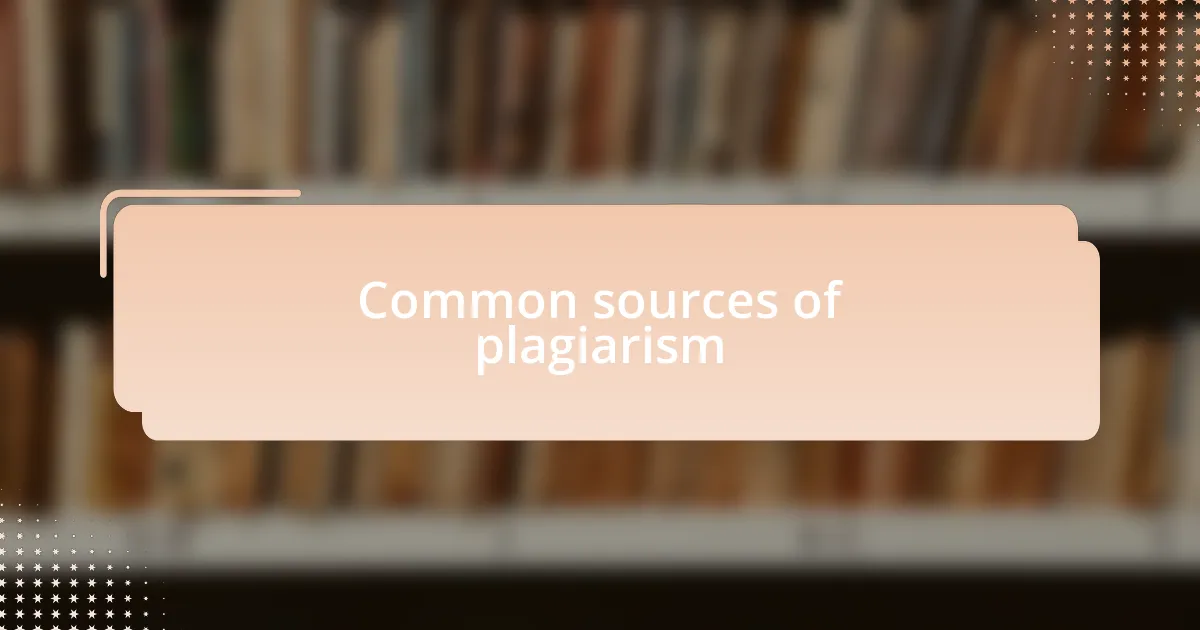
Common sources of plagiarism
When diving into my dissertation, I quickly recognized that textbooks and academic journals were not the only culprits of plagiarism. I’ve come across instances where students unwittingly paraphrase their own previous work without proper citation—a phenomenon known as self-plagiarism. Have you ever reused your prior ideas, thinking it was a harmless practice? I certainly did and learned the hard way that it’s just as crucial to cite my earlier research as it is to cite others.
Another common source of plagiarism lies in online resources. The internet is a treasure trove of information, but with such ease of access, it’s all too tempting to copy-paste excerpts or ideas without proper attribution. I vividly remember the moment I found a stunning statistic that perfectly supported my argument; the excitement nearly led me to skip the citation process. It made me reflect: how many great ideas have been shared uncredited because the lines between inspiration and imitation can blur so easily?
Moreover, collaborative environments can inadvertently foster plagiarism. During group projects or discussions, I’ve seen peers share thoughts that spark similar ideas, sometimes leading to overlaps in writing. It raises a crucial question: how do we ensure that our contributions stand out? I learned that maintaining a clear personal voice and consistently tracking my sources, even in collaborative settings, not only upholds integrity but also enriches the academic dialogue.
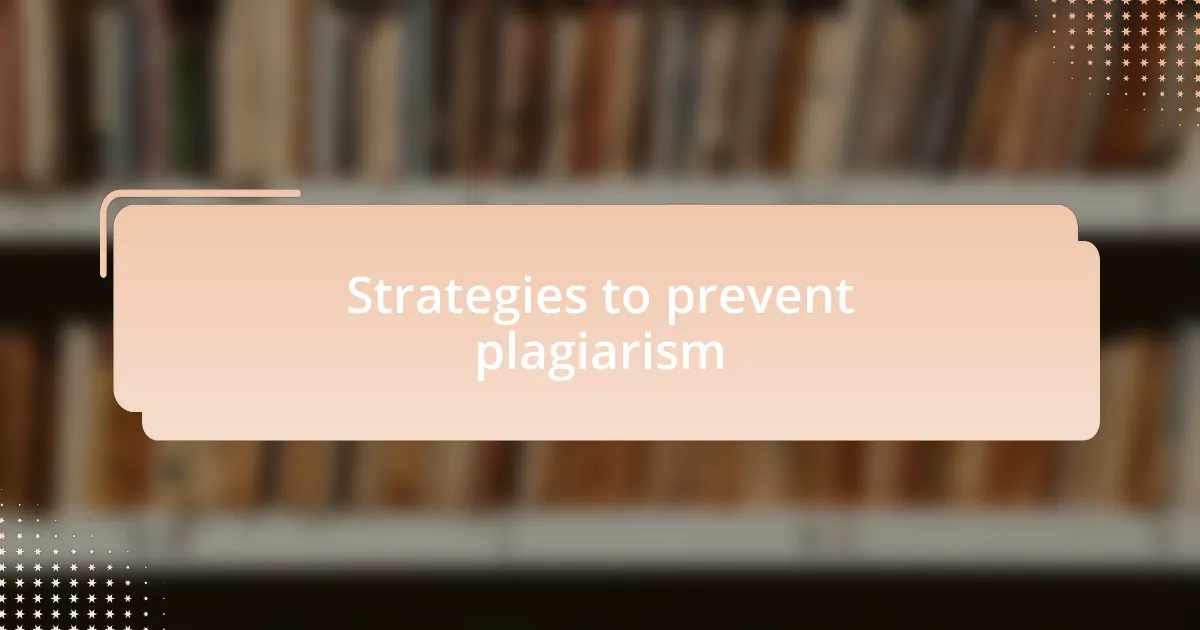
Strategies to prevent plagiarism
When I set out to prevent plagiarism in my work, I found that creating a meticulous research log was invaluable. Documenting every source I consulted—along with my thoughts and ideas—provided a roadmap that clarified where each concept originated. Have you ever been in the middle of writing and suddenly doubted whether you had credited a source? Trust me, keeping a log eliminates that uncertainty and offers peace of mind.
Another effective strategy I adopted was utilizing plagiarism detection software before submission. After personally experiencing the anxiety of submitting my dissertation, I made it a habit to run my drafts through these tools. It was eye-opening to discover even minor phrases that hadn’t been properly attributed. I remember feeling a mix of relief and embarrassment; my writing is my voice, and ensuring that it reflects my integrity is crucial.
Engaging in thorough paraphrasing was also a game-changer for me. Instead of just tweaking a few words, I made a conscious effort to fully absorb the information and express it in my own style. I recall one instance where I struggled to articulate a concept I’d found fascinating, but as I sifted through my understanding, the final product felt authentically mine. Have you tried that? It feels rewarding to contribute original thoughts rather than merely rehashing what others have said.
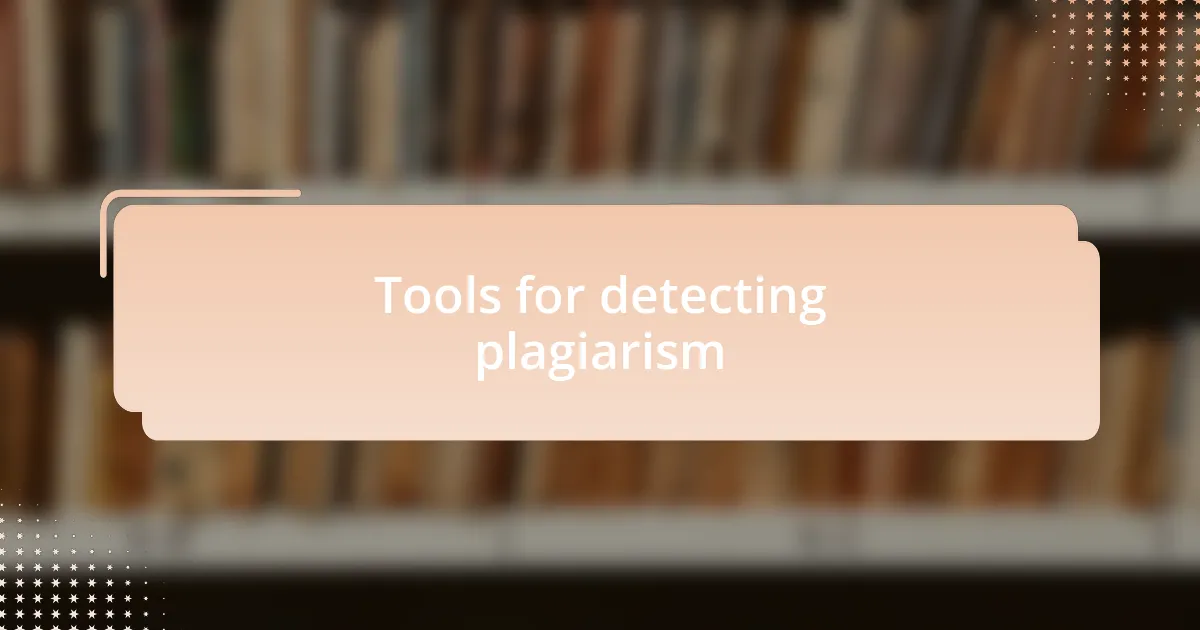
Tools for detecting plagiarism
When it comes to plagiarism detection tools, I’ve found that there are several popular options available that can really make a difference. For instance, services like Turnitin and Grammarly have become staples in academic circles. I once ran a chapter of my dissertation through Grammarly, and it caught a couple of sentences I hadn’t even thought twice about. It was a moment of realization for me—sometimes our familiarity with our own work can blind us to potential issues.
Another valuable tool I encountered was Copyscape, which specializes in checking online content against existing web pages. I remember feeling a surge of anxiety the first time I typed in one of my sections. The relief when it showed a clean slate was almost euphoric, but it also reinforced the importance of originality in my writing. Have you ever wondered how many sources might overlap with yours? Copyscape provided a peace of mind that kept me focused on my unique contributions.
Lastly, I can’t stress enough the value of leveraging institutional resources. Many universities provide access to tools like iThenticate, which is tailored specifically for researchers. I utilized it during my final revisions, and it highlighted overlapping phrases I might have otherwise overlooked. That experience reminded me that even in academia, we’re lifelong learners, continually refining our skills and ensuring our work represents our own authentic voice. How about you? Have you explored your institution’s resources for support in this area?
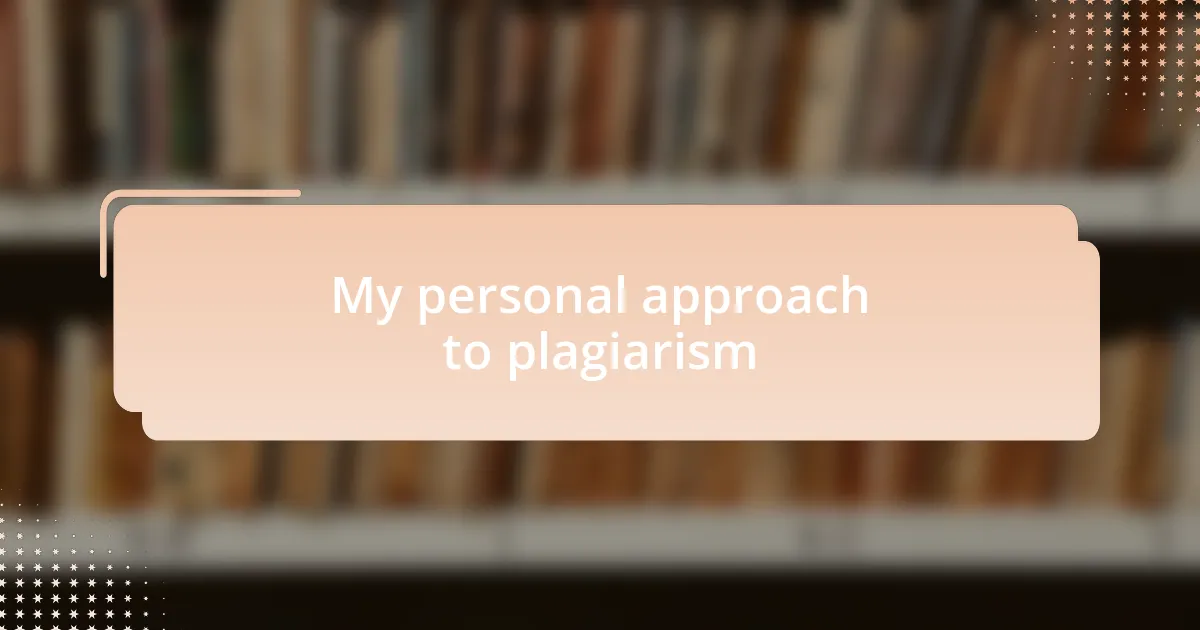
My personal approach to plagiarism
My personal approach to plagiarism has always centered around the notion of integrity in my work. I remember an occasion during my dissertation writing when I mistakenly paraphrased an idea rather too closely. Realizing this not only embarrassed me but also sparked a deeper commitment to understanding proper citation. It made me reflect: how much does our discipline value originality, and how can I contribute to that ethos?
To address my concerns directly, I developed a habit of maintaining a detailed reference log as I researched and wrote. This was not just a chore; it became a tool of empowerment. I found that each citation became a building block for the arguments I was presenting. Does anyone else find that keeping a record enhances their confidence in their own voice? I certainly did.
Additionally, I always sought feedback from peers and mentors, treating every comment as an opportunity for growth. One memorable discussion revolved around the importance of nuanced interpretation of sources, which illuminated how our voices can emerge even when engaging with established ideas. This experience taught me the value of collaboration in academics—an exchange that can turn anxiety about originality into a shared mission for authenticity. How do you approach these conversations in your own academic journey?

Lessons learned from my experience
One lesson that stood out to me was the importance of proactive communication. After I encountered my initial citation error, I felt a surge of anxiety, worried about how it might reflect on my capabilities. However, when I reached out to my advisor for clarification on proper citation practices, I realized that open dialogue not only alleviated my fears but also fostered a supportive bridge between us. Have you ever felt that conversing openly about your concerns could lead to unexpected insights?
The experience also taught me to embrace the learning curve of scholarly writing. I vividly recall nights spent wrestling with the nuances of academic integrity, flipping through style manuals like a detective on a case. What emerged was a deeper respect for the process of scholarship itself. It dawned on me that each error, rather than simply being a source of embarrassment, was an invitation to refine my skills. When have you turned a setback into a stepping stone for growth?
Lastly, I learned that being diligent in my efforts to credit sources is ultimately about honoring the contributions of others while solidifying my own voice. There were moments when I genuinely feared falling into the traps of unintentional plagiarism, yet by focusing on summarizing and analyzing the work of others before weaving in my thoughts, I cultivated clarity in my writing. Does anyone else find that this approach not only preserves integrity but also enriches the depth of their arguments?